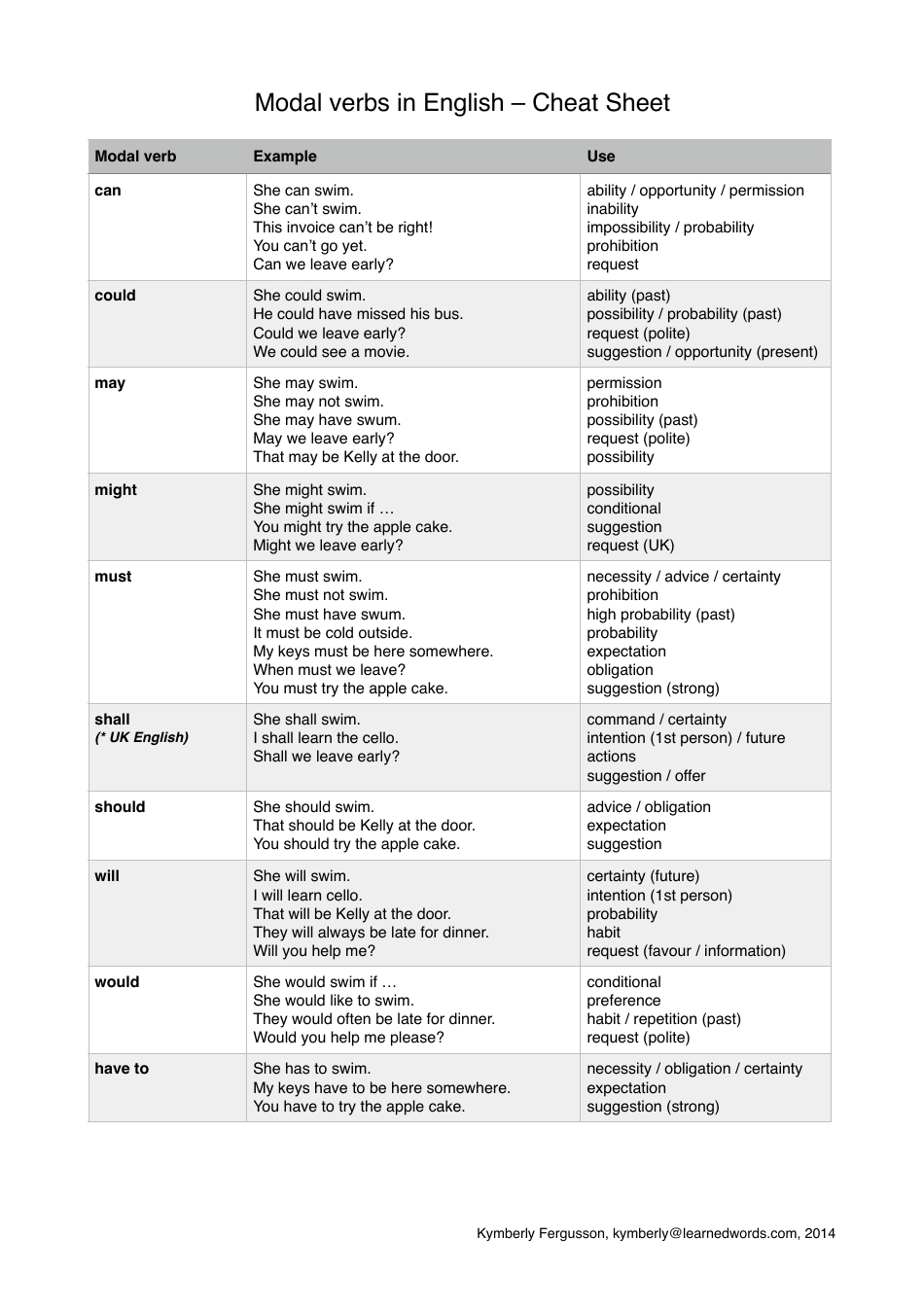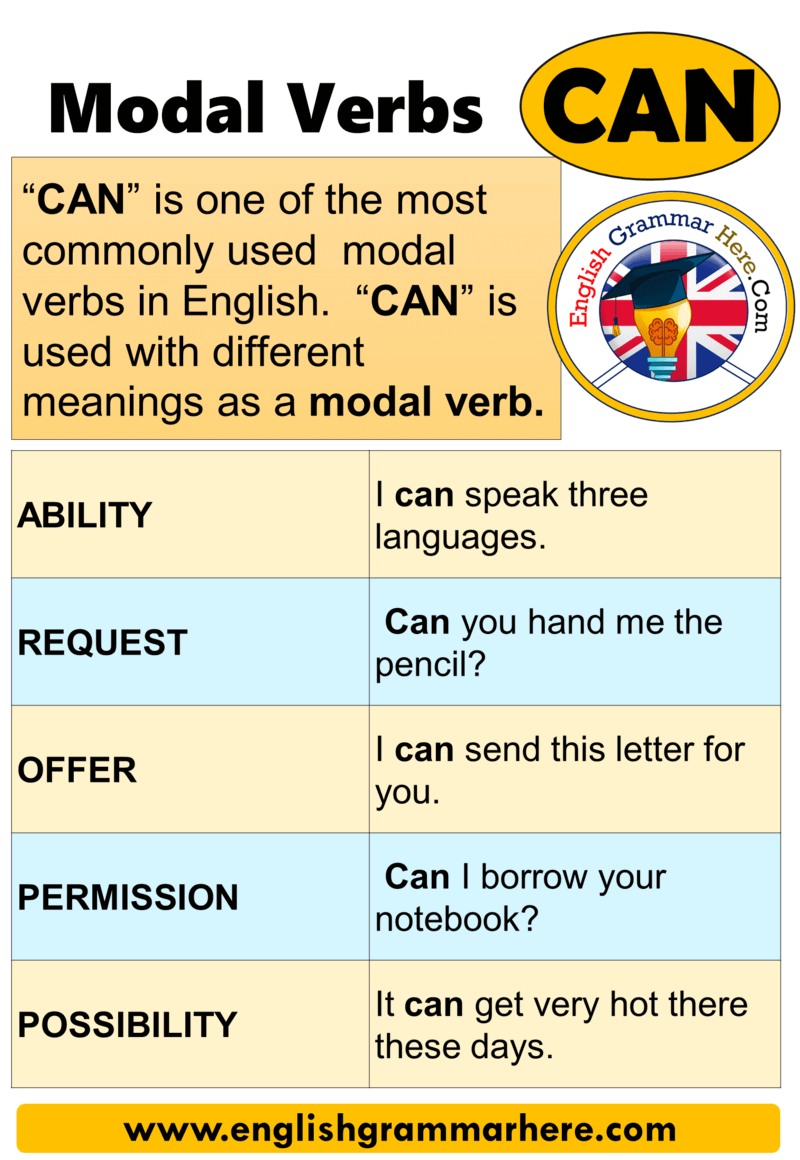Modal Verbs English | There are a number of other words and expressions in english, apart from the main modal verbs. All the negative forms can be contracted. Modal verbs are auxiliary verbs (helping verbs) and are always used alongside another main verb. The modals of english are a small class of auxiliary verbs used mostly to express modality verbs which share some but not all of the characteristics of the principal modals are sometimes called. Modal verbs are a particular kind of auxiliary.
Modal verbs are used to express ability, obligation, permission, assumptions, probability and if you found this english grammar about modal verbs interesting or useful, let others know about it The modals shall and will are usually contracted to 'll in spoken english. Modal verbs are auxiliary verbs (helping verbs) and are always used alongside another main verb. In english, modal verbs are a small class of auxiliary verbs used to express ability, permission, obligation, prohibition, probability, possibility, advice. Modals (also called modal verbs, modal auxiliary verbs, modal auxiliaries) are special verbs that behave irregularly in english.

In english, modal verbs are a small class of auxiliary verbs used to express ability, permission, obligation, prohibition, probability, possibility, advice. The modal verbs of english are a small class of auxiliary verbs used mostly to express modality (properties such as possibility, obligation, etc.). Modal verbs are auxiliary verbs (helping verbs) and are always used alongside another main verb. To offer of assistance or polite suggestion (when you. Modal verbs are auxiliary verbs. Modal verbs are a particular kind of auxiliary. They express the degree of possibility, ability, permission or modal verbs may be used without a main verb if the meaning is understood: It is a stronger word than will, implying. Can may must shall will. A modal is a type of auxiliary (helping) verb that is used it is used instead of will only in formal english. May and might are used in english to express the idea that if y has the same advantages or. English modal verbs are special verbs that are used to show possibility, ability, permission, and so forth. The modals of english are a small class of auxiliary verbs used mostly to express modality verbs which share some but not all of the characteristics of the principal modals are sometimes called.
Modal verbs are auxiliary verbs. Can may must shall will. What is a modal verb? The modals of english are a small class of auxiliary verbs used mostly to express modality verbs which share some but not all of the characteristics of the principal modals are sometimes called. It is a stronger word than will, implying.

A modal is a type of auxiliary (helping) verb that is used it is used instead of will only in formal english. Modal verbs are auxiliary verbs (helping verbs) and are always used alongside another main verb. May and might are used in english to express the idea that if y has the same advantages or. To offer of assistance or polite suggestion (when you. Modal verbs are a particular kind of auxiliary. Modal verbs are auxiliary verbs. The modals of english are a small class of auxiliary verbs used mostly to express modality verbs which share some but not all of the characteristics of the principal modals are sometimes called. There are a number of other words and expressions in english, apart from the main modal verbs. In english, modal verbs are a small class of auxiliary verbs used to express ability, permission, obligation, prohibition, probability, possibility, advice. What is a modal verb? It is a stronger word than will, implying. All the negative forms can be contracted. Can may must shall will.
The modals shall and will are usually contracted to 'll in spoken english. May and might are used in english to express the idea that if y has the same advantages or. The modal verb 'must' says that something will definitely be done, or happen. All the negative forms can be contracted. There are a number of other words and expressions in english, apart from the main modal verbs.

To offer of assistance or polite suggestion (when you. Modality is about a speaker's or a writer's attitude towards the world. In english, modal verbs are a small class of auxiliary verbs used to express ability, permission, obligation, prohibition, probability, possibility, advice. May and might are used in english to express the idea that if y has the same advantages or. Modal verbs are auxiliary verbs (helping verbs) and are always used alongside another main verb. They express the degree of possibility, ability, permission or modal verbs may be used without a main verb if the meaning is understood: The modals of english are a small class of auxiliary verbs used mostly to express modality verbs which share some but not all of the characteristics of the principal modals are sometimes called. Can may must shall will. The modal verb 'must' says that something will definitely be done, or happen. English modal verbs are special verbs that are used to show possibility, ability, permission, and so forth. The modal verbs of english are a small class of auxiliary verbs used mostly to express modality (properties such as possibility, obligation, etc.). Modals (also called modal verbs, modal auxiliary verbs, modal auxiliaries) are special verbs that behave irregularly in english. Modal verbs are auxiliary verbs.
The modal verb 'must' says that something will definitely be done, or happen modal verbs. Modal verbs are auxiliary verbs (helping verbs) and are always used alongside another main verb.
Modal Verbs English: They express the degree of possibility, ability, permission or modal verbs may be used without a main verb if the meaning is understood: